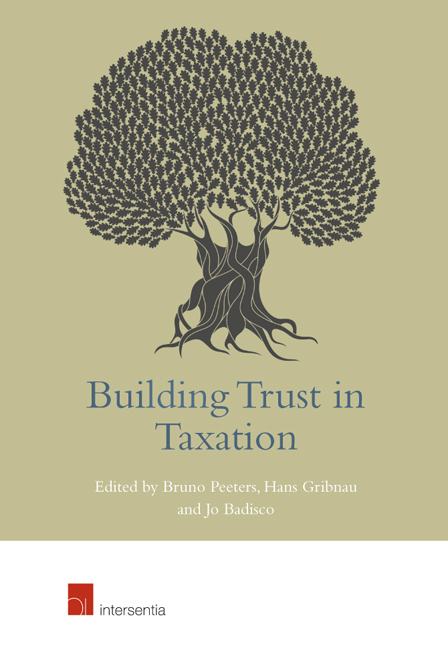Book contents
- Frontmatter
- Preface
- Contents
- List of Authors
- Introduction
- PART I TAXATION, STATE AND SOCIETY: RECIPROCITY AND THE LIMITS OF THE POWER TO TAX
- PART II Trust and morality: tax governance in need of transparency
- PART III International taxation: in search of democratic legitimacy
- PART IV Behavioural aspects of taxation and trust
- Public Attitudes Towards Redistribution Through Taxation
- Does Information about Wealth Inequality and Inheritance Tax Raise Public Support for the Wealth Taxes? Evidence from a UK Survey
Wealthy Tax Non-Filers in a Developing Nation: The Roles of Taxpayer Knowledge, Perceived Corruption and Service Orientation in Pakistan
from PART IV - Behavioural aspects of taxation and trust
Published online by Cambridge University Press: 21 September 2018
- Frontmatter
- Preface
- Contents
- List of Authors
- Introduction
- PART I TAXATION, STATE AND SOCIETY: RECIPROCITY AND THE LIMITS OF THE POWER TO TAX
- PART II Trust and morality: tax governance in need of transparency
- PART III International taxation: in search of democratic legitimacy
- PART IV Behavioural aspects of taxation and trust
- Public Attitudes Towards Redistribution Through Taxation
- Does Information about Wealth Inequality and Inheritance Tax Raise Public Support for the Wealth Taxes? Evidence from a UK Survey
Summary
ABSTRACT
Although tax non-filing and the resulting tax evasion are a challenge to public welfare, particularly in developing countries, scholarly knowledge on taxable citizens who do not register as taxpayers, also known as the ‘ ghosts ‘, is minimal. To expand this knowledge base, this empirical chapter compares rich self-employed individuals identified as non-filers with a randomised group of tax filers with similar socio-demographic backgrounds in terms of two bases of perceived tax system legitimacy: knowledge of taxpayers ‘ rights and perceived corruption in the tax administration. The results indicate not only that both of these factors are related to tax non-filing but that a perceived service orientation of the tax administration is related to increased tax knowledge and lower perceptions of corruption. These findings imply that services which reduce citizens ‘ ignorance of their tax rights and reduce doubts about authorities ‘ correct behaviour might foster the perceived legitimacy of the tax system and in turn increase willingness to pay taxes in developing countries.
INTRODUCTION
Taxes are essential for financing public goods, particularly in developing countries, which are afflicted by an extensive shadow economy and ample tax evasion. Such nations urgently need sufficient tax funds to build up their infrastructure and provide essential public goods like health care, education and social security. Nevertheless, a substantial part of the tax gap in these countries is the result of non-filers: potential taxpayers in the informal sector who not only evade taxes but fail to even register as taxpayers. The estimates of tax non-filing in developing countries are alarming; for example, in India, only about one in six potential taxpayers actually files a tax return. Yet despite being a serious problem for developing countries, tax non-filing has gained little attention in the research, and empirical evidence on determinants of tax non-filing in developing countries is rare, primarily because it is difficult to obtain data on wealthy non-filing residents with substantial taxable income. It is, however, possible to draw indirect conclusions on the legitimacy/nonfiling relationship based on experimental results, US Internal Revenue Service (IRS) statistics, and surveys and field experiments on the informal economy in developing countries.
- Type
- Chapter
- Information
- Building Trust in Taxation , pp. 355 - 376Publisher: IntersentiaPrint publication year: 2017
- 2
- Cited by



